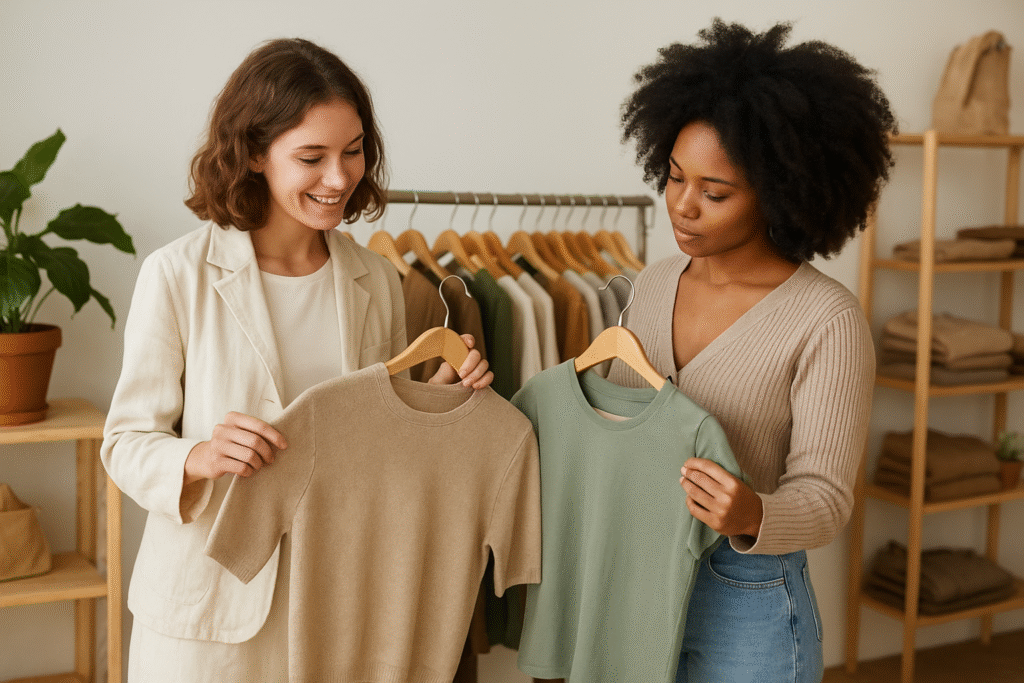Fashion in the UK has always been about creativity and self-expression, but in 2025, it’s also about conscious choices. Women are no longer chasing fast fashion trends at the cost of the environment. Instead, they’re embracing a sustainable wardrobe—a style philosophy that balances aesthetics with ethics.
From second-hand platforms like Depop and Vinted to eco-friendly luxury brands such as Stella McCartney and Pangaia, sustainable fashion has moved from niche to mainstream. British women are building capsule wardrobes, choosing organic cotton and recycled fabrics, and even renting designer dresses for special occasions rather than buying something they’ll only wear once.
This guide breaks down the most important aspects of sustainable women’s fashion in the UK for 2025—helping you shop smarter, style better, and reduce your environmental footprint without compromising on elegance.
1. Second-Hand Shopping: The New Normal
Platforms like Depop, Vinted, and eBay UK have revolutionised how women shop. What was once considered “thrift shopping” is now cool, trendy, and eco-friendly.
- Depop: A Gen Z favourite, where you can score vintage Levi’s, Y2K dresses, and unique pieces you won’t find on the high street.
- Vinted: Perfect for affordable everyday wear and reselling your pre-loved clothes.
- eBay UK: Still a strong contender for everything from vintage designer handbags to upcycled coats.
In cities like London and Manchester, second-hand shops and vintage markets are buzzing. By shopping second-hand, women not only save money but also reduce textile waste, one of the biggest environmental issues linked to fast fashion.
Tip: Buy timeless staples second-hand—like denim jackets, blazers, and handbags—because they last longer and never go out of style.
2. UK’s Best Sustainable Brands
Sustainability in 2025 isn’t just about reusing clothes. Many UK and global brands are creating eco-friendly collections designed with the planet in mind.
- People Tree – A pioneer in ethical fashion, known for organic cotton dresses and fair trade production.
- Stella McCartney – A luxury British designer leading the way in cruelty-free and sustainable luxury fashion.
- Pangaia – Loved for its minimalist loungewear and bio-based fabrics like seaweed fibre and recycled cotton.
- Baukjen – A London-based brand focusing on timeless, slow-fashion collections with a sustainability-first approach.
- Lucy & Yak – Known for colourful dungarees made from organic fabrics and fair-trade practices.
By supporting these brands, UK women are making a long-term investment in fashion that feels stylish but doesn’t harm the planet.
3. Capsule Wardrobe Trend
Minimalism is back in fashion—but this time with a sustainable twist. A capsule wardrobe is a carefully curated collection of clothing that can be mixed and matched to create multiple outfits.
- Why it works:
- Saves money by reducing impulse shopping.
- Reduces clutter while maximising outfit options.
- Promotes mindful consumption.
A typical UK capsule wardrobe in 2025 includes:
- 2 pairs of jeans (light & dark wash)
- 1 tailored blazer
- 2 versatile dresses (day-to-night styles)
- 3 neutral tops (organic cotton or bamboo fabric)
- 1 trench coat (a UK staple)
- Comfortable trainers & ankle boots
This approach not only reduces overconsumption but also elevates personal style by focusing on quality over quantity.
4. Fabrics That Matter: Organic & Recycled Choices
The biggest environmental footprint in fashion often comes from the fabrics themselves. In 2025, organic cotton, hemp, bamboo, and recycled polyester are dominating UK women’s wardrobes.
- Organic Cotton: Uses less water and no harmful pesticides.
- Recycled Fabrics: Old textiles are given a new life, reducing landfill waste.
- Plant-Based Innovations: Materials like pineapple leather (Piñatex) and mushroom leather are growing in popularity.
UK women are becoming more aware of clothing labels, actively checking for certifications such as GOTS (Global Organic Textile Standard) or Fair Trade before buying. This simple habit ensures that fashion choices align with sustainability goals.
5. Renting Dresses for Parties & Events
Why buy a £300 dress for a single night out when you can rent it for a fraction of the price? In 2025, fashion rental platforms are booming in the UK.
- HURR Collective – Offers designer dress rentals for events, weddings, and parties.
- By Rotation – A peer-to-peer rental platform where women can rent or lend outfits.
- My Wardrobe HQ – Luxury rentals from Gucci to Victoria Beckham, perfect for red carpet-style events.
This trend is especially popular in London, Birmingham, and Edinburgh, where young professionals are embracing the idea of “fashion without ownership.”
Renting means:
- Lower costs for fashion lovers.
- Reduced demand for fast-fashion party dresses.
- Access to designer pieces without the guilt of overconsumption.
Conclusion
Sustainable women’s fashion in the UK has evolved from being a trend to becoming a movement. In 2025, style is no longer just about looking good—it’s about making ethical, eco-conscious choices that positively impact the planet.
Whether it’s buying second-hand on Vinted, investing in Stella McCartney’s eco-luxury, or building a capsule wardrobe, UK women are proving that sustainability and style can go hand in hand.
The future of fashion is clear: slow, smart, and sustainable. And the UK is leading the way.
FAQs – Sustainable Women’s Fashion in the UK 2025
Q1: What’s the most affordable way to shop sustainably in the UK?
A: Platforms like Depop, Vinted, and charity shops are the best options for budget-friendly sustainable shopping.
Q2: Which luxury brand focuses on sustainability?
A: Stella McCartney remains the top luxury sustainable brand in the UK.
Q3: What is a capsule wardrobe, and how do I build one?
A: A capsule wardrobe is a minimal collection of versatile, quality clothes that mix and match easily. Start with neutral basics like jeans, a blazer, and a trench coat.
Q4: Is renting clothes really sustainable?
A: Yes—renting reduces demand for fast-fashion event wear and allows women to enjoy designer pieces without long-term waste.
Q5: Are sustainable fabrics worth the higher cost?
A: Absolutely. They last longer, feel better, and reduce environmental harm compared to fast-fashion synthetics.

